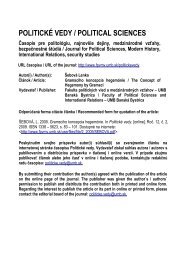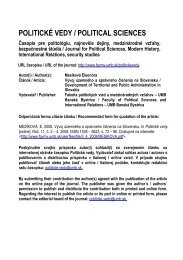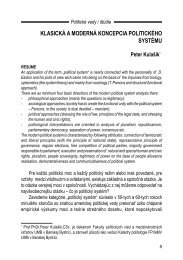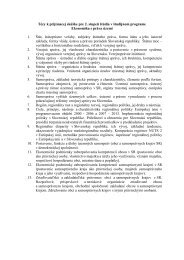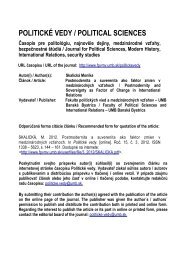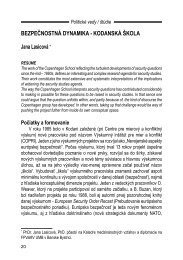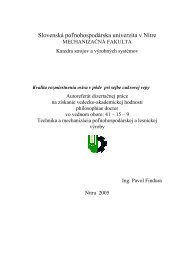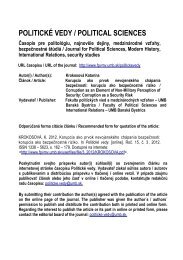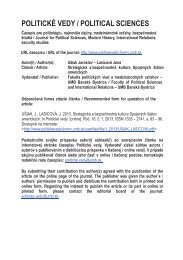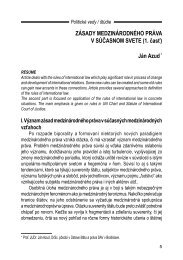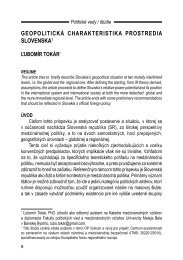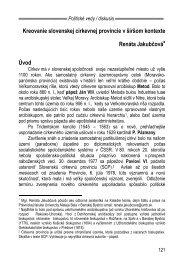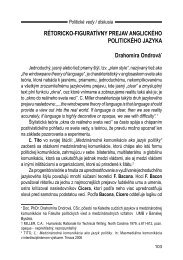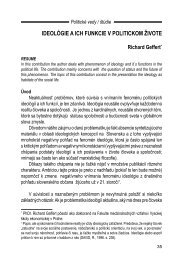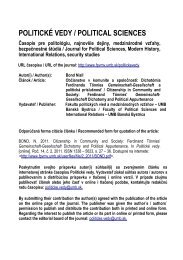MRAVNÃ VÃCHOVA V Å KOLÃCH NA SLOVENSKU A V ZAHRANI ÄÃ
MRAVNÃ VÃCHOVA V Å KOLÃCH NA SLOVENSKU A V ZAHRANI ÄÃ
MRAVNÃ VÃCHOVA V Å KOLÃCH NA SLOVENSKU A V ZAHRANI ÄÃ
Create successful ePaper yourself
Turn your PDF publications into a flip-book with our unique Google optimized e-Paper software.
Movement-like innovations and institutionalised initiatives met in the Anthropology Workshop (led by<br />
me) of the National Institute of Public Education. This team worked out the subject Learning about<br />
man (the combination of psychology, sociology, ethics, philosophical anthropology and other human<br />
subjects 1 ), prepared the necessary teaching aids: curricula for primary and secondary schools,<br />
textbooks (Kamarás, Vörös, 1996/a, 1996/b, 2002), educational and methodological guides (Kamarás,<br />
1995) and other teaching aids (Bohár, 1993; Lénártné, 1993; Kamarás, Sárkány; 1993, Kamarás,<br />
Sárkány, Varga, 1993; Kuslits, 1993), one after the other. This innovation has became an organic part<br />
(entitled Learning about man) of the new National Core Curriculum (NCC) introduced in 1996 by the<br />
socialist-liberal coalition government (National, 1995) This area of knowledge became one of the most<br />
characteristic subjects of the official curriculum, According to the education-sociological surveys it<br />
was acceptable for the majority of educational agents (teachers, parents and students) with various<br />
ideologies. The considerable support was due to the many-dimensional image of man (biological−<br />
psychic−sociological−mental dimensions) whose "general human" basis underlay a consensus which<br />
was acceptable for people of Christian, socialist and liberal values as well. Many students, parents,<br />
teachers saw, or learned after some years of teaching experience, that this approach of man could<br />
successfully serve an educational practice that helped students to understand the phenomena of the<br />
World, related to the Whole, to become capable of loving in a clever (yet not self-seeking, but<br />
devoted) way and to realise a society based on giving and responsibility.<br />
2. The main characteristics of the subject Learning about<br />
man/Anthropology and Ethics<br />
The consensus-like Learning about man has a many-dimensional image of man made up of biological,<br />
psychological, sociological and spiritual dimensions that form an integral whole. This polyphonic<br />
image of man makes choosing and ranking the different dimensions according to one's world-view<br />
possible.This conception synthesises everything that is together in man, that the separate human<br />
sciences − since this is their task − examine according to their own (particular) points of view, with all<br />
of its advantages and disadvantages. In our Learning about man art is included as an equal approach −<br />
besides the biological, psychological, sociological, ethical, cultural anthropological, philosophical,<br />
theological, ecological, political and other points of view −, since in the case of questions such as love,<br />
freedom, hope, order, finiteness the limits of human sciences can be felt well and the answers of art<br />
may be considered more authentic.<br />
First among equals can be human sciences representing meta-level. Ethics and Philosophical<br />
anthropology can be regarded as this kind in the first place. Knowledge of the self, relations and of<br />
society may get emphasis as well as preparation for creating a home and founding a family. Beyond<br />
doubt different kinds of Learning about man would be desirable in schools depending on whether<br />
good mothers and fathers of the family, entrepreneurs, good wives of the house, confident and<br />
empathetic contact-makers or the Homo politicos are aimed at. It is possible to elaborate several<br />
variations of Learning about man, for example focusing on self-knowledge, social studies, social<br />
psychology, ecology, cultural anthropology and practice-oriented ones (manners, etiquette, life style<br />
and creating a home, physical and mental health) but no one can operate without ethical<br />
reflection.Ethics can be more effective as a part of Learning about man synthesising the various<br />
human sciences than in itself, in which case it can easily become moralisation. The same holds true for<br />
self-knowledge, which in itself can easily become “psychologism” (“psychologiosation”), and for<br />
social studies, which lacking the company of other human sciences may easily commit the sin of<br />
“sociologism” (“sociologisation”) or politicisation. In a short time after establishing the name<br />
transformed Learning o, ethics and society or Anthropology and Ethics. At the framework of the new<br />
subject ethics is a so called consensus ethics. Consensus can be reached, first of all, on the basis of the<br />
fact that humans make up one species. Secondly there are quite a lot common points in the various<br />
morals and ethics. Further on thinkers of different world-views equally reckon with fundamental<br />
values, the Universal Declaration of Human Rights and today's other fundamental documents also<br />
reckon with fundamental values and virtues. Consensus ethics is not a 'colourless-odourless', sterile<br />
1 Cultural anthropology, ecology, communication, political science, religious science)<br />
111



